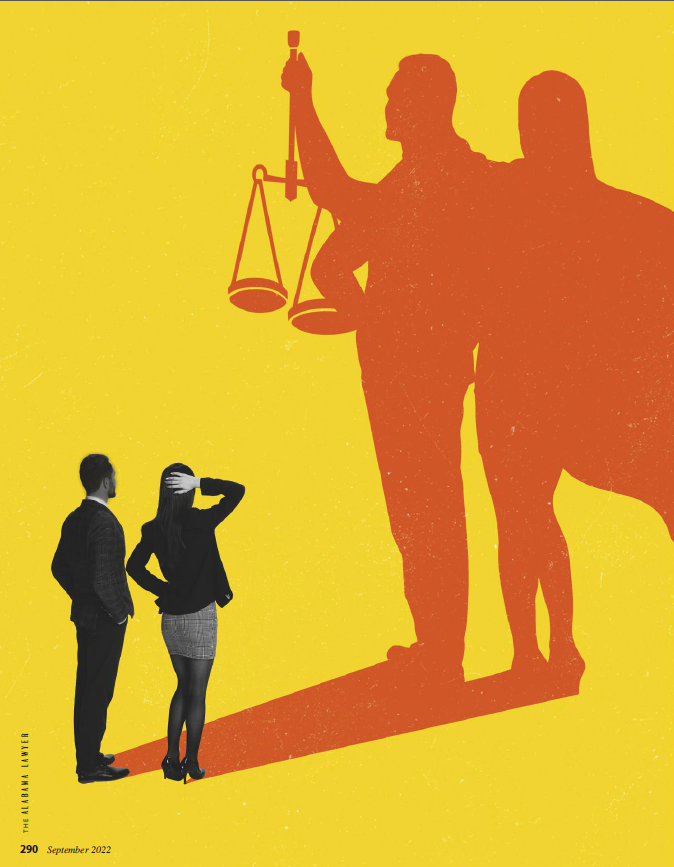Who Do We Think We Are?
| Publication year | 2022 |
| Pages | 0291 |

Introduction: Lawyers as Stewards of a Noble Profession
In the final scenes of the movie "A Few Good Men" - one of the great classics of legal cinema - under dramatic, but extremely risky cross-examination by Lt. Daniel Kaffee (played by Tom Cruise), Col. Nathan Jessup (played by Jack Nicholson) admitted to directing the kind of "Code Red" discipline which led to the unintentional death of a Marine stationed at Guantanamo Bay, Cuba. Although contrary to military law, Col. Jessup explains that he did it for what he personally determined to be the greater good. When he is being arrested following this in-court admission, he is outraged, and he and Lt. Kaffee - who has up until this trial spent his career simply processing cases, looking for the easy way out and using his status for his own comfort, but is now finally embracing his true calling as a lawyer - have the following exchange:
Col. Jessup: ... You have no idea how to defend a nation. All you did was weaken a country today, Kaffee. That's all you did. You put people's lives in danger. Sweet dreams, son.
Lt. Kaffee: Don't call me son. I'm a lawyer and an officer in the United States Navy. And you're under arrest....
While the status of military officer is generally held in high esteem, one wonders about how the public views the status of the typical modern lawyer. We certainly do ourselves no favors with overly-aggressive and uncharitable litigation antics, unprofessional and sometimes simply humiliating television commercials, and the like (as well-known and long-circulating lawyer jokes demonstrate). Of course, there are some perceptions that may linger regardless of how we hold ourselves out.
Regardless, we should do whatever we can to help our profession regain and maintain its dignity. In that regard, perhaps a better starting question is: Who do we think we are? What do we think our profession is, and what should it be? Are we true professionals who care deeply about the law and its role in preserving society, or are we, as some have asserted, mere claims processors or technicians?
Such an inquiry should drive us to recall the great historic legal tradition into which we entered when we became members of the bar - a tradition that is one of the core pillars of Western civilization. We often call it the legal "industry," which in many ways is unfortunate. Historically, the legal profession was seen as a true profession, as a calling. Indeed, in the past - meaning in our past as a body of lawyers - entry into the profession followed one's being literally "called to the bar."1 Remember that even terms like bar connect us to our history, and show that the profession was intended to have a particular dignity. The bar refers to a wooden rail or partition in a court room which separated the public area from those qualified to address the court on the law. To be called to the bar is to be recognized and received into this body of professionals.2

How does such an ancient and noble profession lose its perspective and lose the sense of dignity that should follow? It is actually quite easy, especially given the hectic schedules that many of us follow, to allow what we do to become a mere technical, plug-and-chug industry. We either never learned, or have long forgotten, the roots of our noble profession. So many things that we do day to day without much thought are actually tools that have been handed down as a part of the great and ancient English law tradition.
We are not mere technicians or claims processors, loudmouth brag-gards or bullies who manipulate the law. Rather, we need to think of ourselves as stewards entrusted with a sacred duty to the public and society, a notion aptly summarized by the Florida Supreme Court in a 1942 decision:
The administration of justice is a composite rather than an individual concept. It is a derivative of Christian ethics and with us has attained a significance that it has nowhere else on earth. It contemplates the righteous settlement of every controversy that arises affecting the life, liberty, or property of the individual. Lawyers and judges are stewards of the law provided for this purpose....
Since the practice of the law deals with the most abiding and the most vital relations of life, we speak of it as a great and honored profession. Mr. Justice Brandeis characterized a profession as "an occupation for which the necessary preliminary training is intellectual in character, involving knowledge and to some extent learning as distinguished from mere skill, an occupation which is pursued largely for others and not merely for one's self, an occupation in which the amount of financial return is not the accepted measure of success." In fact, the practitioner who makes financial return his main objective will experience little of the real joy that come to those whose interest in the law rises above the economic.
The administration of justice is the business of the public. Members of the bar are stewards commissioned to perform that business. Their stewardship will be successful in proportion to the manner in which they take the public into their confidence and perform it with a fidelity alike to the state, to client, and to the profession....
...
Whatever truth there is to the charge that the public no longer trusts the bar is not due to the fact that a majority have become ethically obtuse. It is due to the fact that an unscrupulous minority are unfaithful stewards, who insist on placing the emphasis in the wrong place; too much concern about fees and winning cases and too little concern about administering justice in the way to inspire public confidence. Making a fee is important but it is incidental to doing justice and is not the "accepted measure of success" at the bar....3
And as stated by a California federal district court:
... We live in a nation governed by the rule of law. We've constructed a powerful government to administer that law - a government that can deprive a person of property, liberty, and even life. But unlike governments of men, which depend on might, our government of law ultimately depends on the consent of the governed for its continued existence. The public must trust that the government and the legal system that under-girds it are fair and just.
Lawyers serve as both stewards and servants of that trust. Since well before the law was an industry, our society looked to the profession to safeguard a complex system that keeps our country going....4
The goal of this article is to briefly examine just a few of the many aspects of our day-to-day practice of quite ancient and distinguished lineage which should generate deeper appreciation. As will be necessary for an article of this length, the discussion is highly generalized, and each subject is certainly worthy of more detailed consideration. The hope is, however, that by even taking a quick look at the historical development and weight of many of the tools entrusted to us, we will be given pause to consider and reevaluate the true dignity of our profession.
A Short History Of Some of The Tools of Our Profession
The Common Law
Alabama has always been, of course, a common law state.5 This principle is expressly stated in the Alabama code, which provides that "[t]he common law of England, so far as it is not inconsistent with the Constitution, laws and institutions of this state, shall, together with such institutions and laws, be the rule of decisions, and shall continue in force, except as from time to time it may be altered or repealed by the Legislature."6 As Alabama practitioners, we frequently call upon and utilize the tools of the common law - elements of common law causes of action, common law remedies and defenses, etc. - as we have been trained to do, but without much thought to the fact that those tools are the end product of an ancient development which has been entrusted to us to maintain for the good of society.
What we know as the common law - often referred to as judge-made law or case law, as it evolved through the application of general maxims, logic, and reason to individual cases - began to come into existence almost 1,000 years ago from a need to bring a sense of uniformity and consistency to what was a patchwork of differing local legal systems. Many historians trace the beginnings of the English common law system to the Norman Conquest by William the Conqueror in 1066. Prior to the Conquest, law in Anglo-Saxon England was controlled by various local practices and customs:
There were three distinct systems in place: the law of Wessex, the law of Mercia, and the Danelaw. But there were differences of detail, particularly in procedure, in each of the 32 counties. Oath [and] ordeal ... were universal modes of proof; but their detailed operation varied from place to place and according to the status of the parties. Since all proceedings were oral, legal tradition was unstable. Litigation ... was as uncertain as a game of dice.7
Following the Conquest, however, now-King William I recognized that any effective lordship over the great island required a much more organized administration of justice and a uniform system of law. One of the major components of William's efforts in this regard was his establishment of the Curia Regis ("King's Court"). The Curia Regis was a royal household of advisors and counsellors - something which was not unusual and existed in some form even under the Anglo-Saxon kings8 - but which also became, under William, an actual body which would, along with the king, hear petitions and administer the king's justice.9 As noted above, the king and his advisors would sit on a literal bench against a wall, a practice which eventually provided the name of one of the most important of the king's courts: the Court of King's Bench.
However, the king did not administer his justice in this way...
To continue reading
Request your trial
